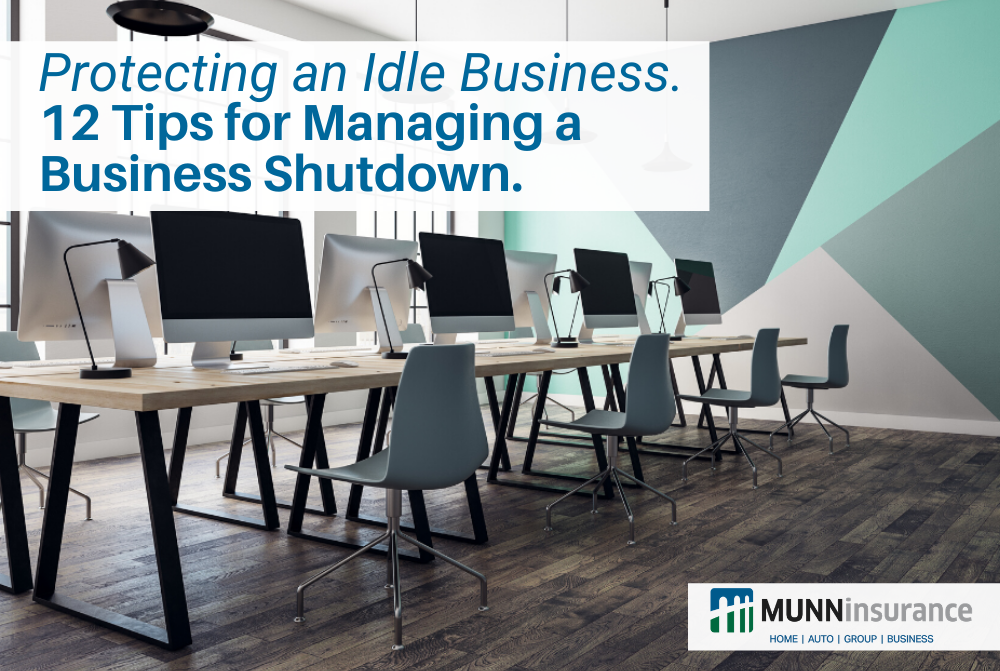Protecting an Idle Business. 12 Tips for Managing a Business Shutdown
The continued spread of COVID-19 has forced communities, businesses and governments to adjust to an ever-changing reality. These are certainly unprecedented times. Business leaders have had to make some very difficult decisions; whether to stay open and how that would look or whether they should close.
If you have been forced to close your business, there are certain precautions that you should take to ensure the safety of your building. We have put together these 12 tips to help you ensure that measures are in place should your business be forced to close and your property is vacant.
- Contact Your Insurance Broker: Should you be forced to close your building and are leaving your building vacant, it is important that you contact your insurance broker to let them know of the situation. They will work with you to look over your policy and ensure that any extra requirements are taken.
- Make sure that your employee contact information is up to date and that you have a plan to keep everyone updated regularly.
- Develop a communication plan to stay in touch with your customers and keep them informed.
- Contact all vendors and suppliers to ensure deliveries are halted or redirected. This would include mail, couriers, coffee and water suppliers, etc. Determine the frequency of cleaning that would be required as well and adjust that schedule.
- Ensure that all fire panels, sprinkler systems and alarms are operational. The risk of arson increases when buildings are vacant so ensure that all combustible materials are removed from the area around your building(s); at least 8 metres (26 feet) away from non-masonry and blank exterior walls of the building.
- Ensure that any stock or other valuables are locked up and stored securely. Remove all cash from the premises.
- Consider installing a security system if one is currently not installed. Security systems should be connected to a 24-hour central monitoring station to increase notification and police response times.
- Maintain electrical to your building if there are any appliances such as fridges, freezers, coolers, etc. that require uninterrupted power. If electrical is not required, switching the power off at the main breaker will help to prevent the possibility of an electrical short circuit causing a fire.
- To conserve energy, ensure that your building’s heating is set between 5 C and preferably at 15 C. In colder winter months, ensure that the temperature in vacant rooms doesn’t fall below 15 degrees as water pipes may freeze and burst, resulting in significant property damage. Rooms containing diesel engine drivers for fire pumps should be set at 21 C.
- Ensure that someone visits the property daily to perform visual inspections. When conducting inspections it is important to check every room to ensure that there are no water leaks or broken pipes. Keep a log noting date, time and capturing a signature from the individual conducting the inspection. If you have security patrols, increase the frequency of visits to the property.
- Empty all fridges and ensure there is nothing left at work stations that could spoil over time. Food and other garbage left around could attract rodents and other uninvited guests.
If you have questions about how to properly secure your building during a temporary shutdown or need advice on any other issue, please contact Munn Insurance toll free at 1-855-726-8627 today.
Related News
Recent News
How to Save on Insurance Amid Uncertainty of Tariffs and Trade Wars
In today’s global economy, trade wars and tariffs are a hot topic, and their potential impacts reach beyond just the cost of goods like cars, appliances, and steel. If tensions between countries like Canada and [...]
Get the Best Auto Insurance Quote in Nova Scotia: A Step by Step Guide
When it comes to auto insurance, everyone wants to ensure they’re getting the right coverage at the best price. Whether you're a first-time car owner or a seasoned driver in Nova Scotia, the process of [...]
Unlock Big Savings with Group Insurance Discounts
At Munn Insurance, we know that everyone loves saving money—especially when it comes to home and auto insurance. Did you know that you may qualify for exclusive discounts just by being part of certain groups [...]












